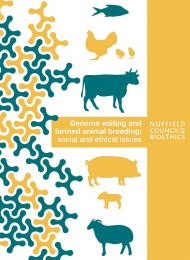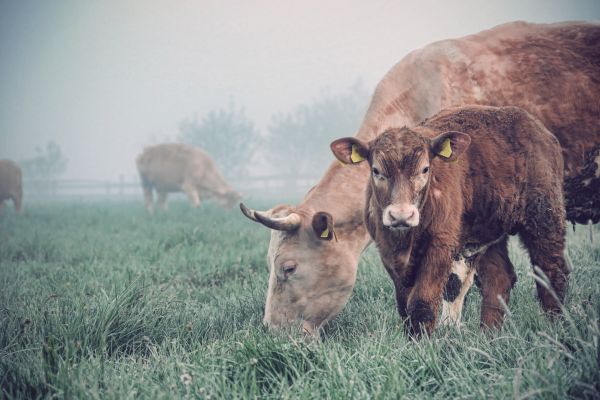Genome editing and farmed animal breeding: social and ethical issues
Report
Published 01/12/2021

Consumers and citizens
See chapter 5 of the full report
Most supermarkets and retailers in the UK now offer a wide choice of meat and animal produce – ranging from ‘high-welfare’ produce such as RSPCA Assured chickens and organic meat, to cheaper, sometimes processed, forms of meat and dairy produce. While people often state a preference for high welfare products when asked, in practice consumers may be attracted by lower-priced food, or it may be the only choice available.
Value chains and power dynamics in the food system
From the farm to the marketplace, there is a ‘value chain’ where each stage of the food production process – e.g. processing, packaging, delivery – adds to the retail cost. For example, the average price of milk ‘at the farm gate’ in the UK in April 2021 was roughly 30 pence per litre. The average price of a litre of milk in a UK supermarket was roughly 85 pence. This is a relatively short value chain involving farmers, milk processors, wholesalers and retailers. Other types of foods have much longer chains.
Major retailers hold a great deal of power within the food system. The main factor driving the choice of products available to consumers is the potential for retailers to expand their share of the market. Whilst consumers can choose from a variety of foods on the supermarket shelves, as individuals they generally have little influence on the range of foods that are offered for sale, except perhaps as part of nationally coordinated campaigns.
Public perceptions and attitudes are, nonetheless, likely to be significant factors in influencing how far genome editing technologies lead to novel foods appearing in shops.
Public attitudes to genomic technologies and novel foods
We commissioned an independent review of research into public perceptions and attitudes to the use of biotechnologies in agriculture and novel foods. The review offers four main conclusions:
- Public attitudes depend upon how members of the public frame the innovations (e.g. whether as technological fixes, novel foods, or farming practices).
- The reasons for, and intentions of, the applications are more important than the technical differences in the methods used.
- The perceived benefits (rather than risks) are likely to be a critical factor in acceptance of specific applications.
- The issue of ‘naturalness’ and people’s concern for the environment are also likely to be important.

Public deliberation on genome editing and farmed animals
To help us to understand better what kinds of values and considerations informed people’s response to genome editing as a prospective breeding technology, we commissioned a rapid online dialogue during June and July 2021. As the discussion broadened out, it became clear that, regardless of the breeding system used, participants were concerned about animal welfare standards in current intensive farming systems.
Generally, participants welcomed the possibility that genome editing could improve the health and welfare of farmed animals, e.g. through improved resistance to disease. They recognised positive reasons for using genome editing, such as securing equitable access to food, improving the quality of animal products, and reducing their environmental impact – as long as these were compatible with promoting higher standards of animal welfare, and the technology was carefully regulated.
However, participants in our dialogue were wary of the potential of genome editing to exacerbate what they saw as undesirable trends of intensification in farmed animal production. For this reason, they viewed the presentation of genome editing technologies as a way of accelerating conventional breeding practices as a reason for concern, rather than reassurance. In particular, they were opposed to genome editing being used when it was only to promote the interest of producers.
As the dialogue progressed, a central question emerged:
"Will applying this technology take us closer to, or further away, from the agricultural systems we should aim for in the future?"
FIND OUT MORE ABOUT THE PUBLIC DELIBERATION
Aspirations for the UK’s future food system
Whilst the use of genome editing technologies in farmed animals offers the potential to help address some of the societal challenges we face with our current food and farming systems, it is important to note that many of its proposed applications aim to respond to challenges that have been caused by humans and/or to satisfy human wants. Ethical appraisal should take into account not only how well the intended results of a particular application of a technology meet moral standards and promote justice, but also whether there might be feasible, and ethically preferable, alternative ways to address the problems it is trying to tackle.
There may be cases in which altering the biology of an animal is a reasonable thing to do in order to meet human needs, but in other cases, alternative action may be preferable. Within an overall strategy which aims to secure a more just and sustainable future of the food and farming system, alternatives to the use of genome editing technologies in farmed animals could include the following:
- Encouraging and promoting incremental dietary change at national levels to consume less meat overall (e.g. as set out in the UK National Food Strategy)
- Reducing waste in the food system (e.g. more recycling, using more renewable energy sources, improving sanitation, reducing water wastage)
- Developing novel foods such as cultured meat and plant-based alternatives to meat and protein
Conclusions in brief
The emergence of genome editing provides an opportunity to align public policy with public interests and aspirations for the next generation of biotechnologies in food and farming.
To inform the development of policy, law and regulation in this area, more initiatives are needed to explore public views about how new breeding technologies might find a place in the future of the food and farming system. The focus of governance should not be limited to questions of the safety or direct harms to human or animal health arising from applications of the techniques. It must address how the uses to which new technologies are put can be regulated to secure a just and sustainable food and farming system.

Share